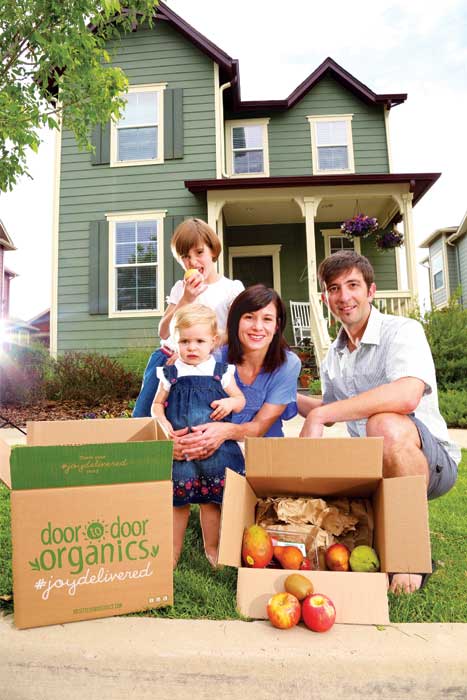
Celeste, 2, Mira, 7, Jessica and Jason Agur display what’s left of the week’s delivery of organic food in front of their Stapleton home.
The mere thought of taking the kids to the grocery store is reason enough for some local residents to willingly pay a little more to have their produce and other groceries delivered to their door. But kid hassles aren’t the only reason. From freshness to control over where their food comes from to the thrill of opening a package, organic produce home-delivery services are gaining popularity.
“We know when you take the risk out of food production in terms of creating environmental changes, it makes people feel better about what they’re eating,” says Jessica Kibble, director of marketing for Mile High Organics, which offers non-GMO products. It was that desire to continue to buy organic produce that led Stapleton resident Jessica Agur to find a source of local, organic produce after she and her family moved from Atlanta. There, they would frequent a large farmers market where they loved buying local, farm-raised, organic foods.
In Denver, Agur, the mother of two young children, felt the health food stores were just a tad too far away and the major grocery stores didn’t have the selection she wanted. She noticed her neighbor received deliveries from Door to Door Organics and gave it a try nearly a year ago, recently adding the service’s meat, dairy and other items to her produce order.
Stacy McDonald, of Park Hill, says with working and attending college full-time, she just doesn’t have time to shop anymore. A customer of Mile High Organics for the past four years, she likes that their items are all GMO-free. She also feels she’s eating better. “I eat more seasonally now and I’m far more likely to buy local since (Mile High Organics) puts where the food is from on the website,” she says.
To Cambria Jacobs, vice president of marketing for Door to Door Organics, the success of the company and the concept of online grocery shopping isn’t a big surprise, considering how many other things people order online. “We get our medicine, our books, our dog food (online) and why not food?” she says. In addition to produce, both services offer meal kits and other grocery goods.
Jacobs says their clients are primarily very busy, well-educated women. “Time is not on their side,” she says. “Fifty percent of our customers have children, and anyone with small children knows going to the grocery store can be a challenge.”
The kid factor is a consideration for Agur. “We go to the store and we have to wrangle the kids,” she says. “If I went to the store and hunted around, I could probably save a little money but time is money, so if I can mark that errand and that frustration off my list, I’m willing to put a few extra dollars into it.”
Both Door to Door Organics and Mile High Organics say their prices are comparable to higher-end health food grocery stores, if not less. McDonald says her grocery budget dropped, primarily because she sticks to a grocery list. “I don’t have any impulse buys,” she says.
Food freshness is another perk to home-delivery customers. Kibble says conventional grocery stores are stocked to make a store look full and food is often on display too long. “We get our produce in daily, we order to demand and because we go from a warehouse environment right to your door, it isn’t lying around the same way it would at the grocery store.”
Agur still goes occasionally to buy the specific cereals her kids like. “I like (the service) for the things that are more important to eat, that are locally grown and organic,” she says.
The organic produce delivery services don’t see themselves as a threat to local farmers markets either. Jacobs feels the two can augment each other. “If you can’t get to the farmers market, or they didn’t have something you wanted, you can still order online.” Because the online companies also offer other items that might not be available at a farmers market, customers can decrease their produce delivery orders during the farmers market season while continuing to buy other items online that support local producers.
A major benefit of the service is the novelty of opening up the box to see what’s inside. It might be rainbow carrots the kids have never seen before or a peach variety that’s a twist on the usual, all fresh off the farm. “Kids get more engaged in understanding where their food comes from and they are more interested in trying it because it comes from a big box every week,” says Jacobs. It’s fun for the adults too. “It’s fresh and I get excited to cook with it,” says Agur. “It feels like a gift.”




0 Comments